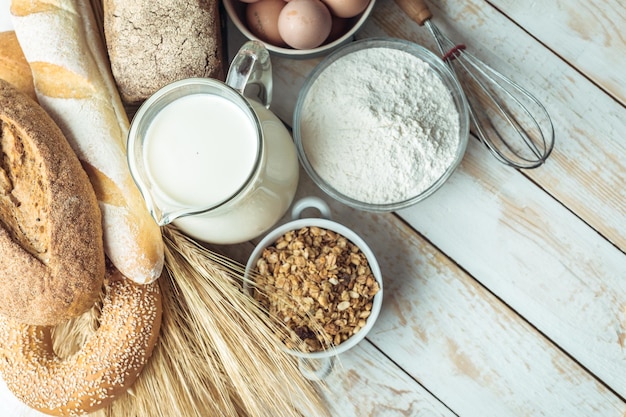Understanding the Nutritional Profile of Flour

Did you know that flour is a versatile ingredient packed with essential nutrients?
When it comes to nutrition, flour is a hidden gem.
Flour is not just a basic baking ingredient; it’s a nutritional powerhouse.
Explore the fascinating world of flour nutrition facts and discover its benefits.
Flour is more than just an empty carb; it’s a source of essential vitamins and minerals.
The nutritional content of flour varies depending on the type of grain used.
Looking for a gluten-free option? There are several nutritious flours available.
Flour provides a good source of energy to fuel your day.
Don’t underestimate the importance of flour in a balanced diet.
Incorporate whole grain flour into your recipes for added fiber and nutrients.
Flour is a staple in many cultures, providing nourishment for centuries.
From bread to pastries, flour forms the foundation of many delicious foods.
If you’re watching your weight, choose low-calorie flour alternatives.
Discover the hidden health benefits of incorporating almond flour into your diet.
Coconut flour offers a unique flavor and a good source of healthy fats.
Did you know that quinoa flour is a complete protein source?
Rye flour isn’t just for savory dishes; it adds a nutty flavor and nutritional value to baked goods.
Buckwheat flour is gluten-free and rich in fiber and essential minerals.
Understanding the Nutritional Profile of Flour part 2
Chili enthusiasts, rejoice! Chili-flavored flour is the perfect way to add a kick to your dishes.
Make your mornings healthier by swapping refined flour for nutritious oat flour in pancakes and waffles.
Rice flour is a popular gluten-free option and a staple in many Asian cuisines.
Potato flour adds a unique texture and nutritional value to gluten-free baking.
Experiment with chickpea flour in your recipes for a boost of protein and fiber.
Teff flour is a nutrient-dense option that’s gaining popularity among health-conscious individuals.
Discover the world of ancient grains and their impressive nutritional profiles.
Flaxseed meal is a healthy addition to baked goods, providing omega-3 fatty acids and fiber.
Quinoa flour is a versatile and nutritious alternative to traditional grains.
Beetroot flour not only adds a vibrant color to your dishes but also offers numerous nutritional benefits.
Explore the diverse flavors and nutrients of alternative flours like amaranth and millet.
Almond flour is a popular choice for gluten-free baking, and it’s packed with protein and healthy fats.
Coconut flour is not only gluten-free but also high in fiber and low in carbohydrates.
Lentil flour is a great way to increase the protein content of your recipes.
Embrace the goodness of whole wheat flour for added fiber and nutrients.
Swap regular flour for spelt flour for a nutritious twist on your favorite recipes.
Tapioca flour is a popular gluten-free thickening agent and provides a unique texture to baked goods.
Discover the nutritional benefits of using barley flour in your cooking and baking.
Oat flour is not just for cookies; it’s a versatile ingredient that adds nutrition to many dishes.
Cashew flour is a nutty and nutritious option for gluten-free baking.
Experiment with chestnut flour in your recipes for a unique flavor and a dose of vitamins and minerals.
Explore the world of gluten-free baking with nutritious sorghum flour.
Pumpkin seed flour is a fantastic source of protein and a great addition to your favorite recipes.
Try using hazelnut flour in your baking for a rich and nutty flavor with added health benefits.
Sweet potato flour is gaining popularity for its nutritional value and delicious taste.
Incorporate black bean flour into your diet for a boost of plant-based protein and fiber.
Sunflower seed flour is a nutrient-dense option for those looking to elevate their baking game.

